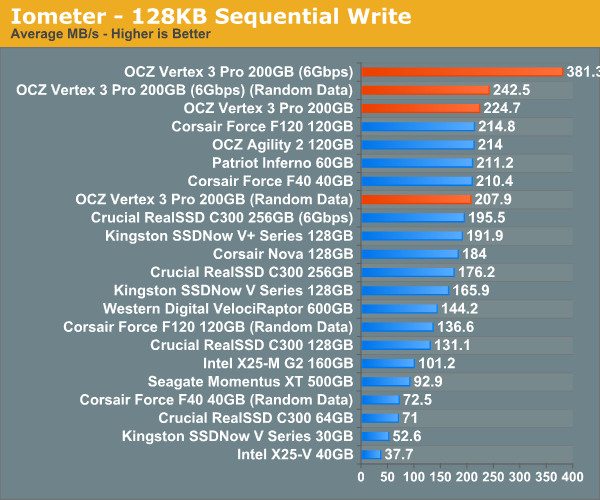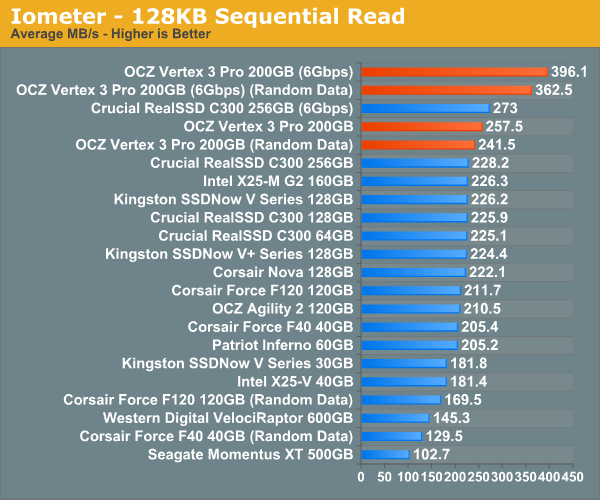OCZ Vertex 3 Pro Preview: The First SF-2500 SSD
by Anand Lal Shimpi on February 17, 2011 3:01 AM ESTSequential Read/Write Speed
To measure sequential performance I ran a 3 minute long 128KB sequential test over the entire span of the drive at a queue depth of 1. The results reported are in average MB/s over the entire test length.

This is pretty impressive. The new SF-2500 can write incompressible data sequentially at around the speed the SF-1200 could write highly compressible data. In other words, the Vertex 3 Pro at its slowest is as fast as the Vertex 2 is at its fastest. And that's just at 3Gbps.
The Vertex 3 Pro really shines when paired with a 6Gbps controller. At low queue depths you're looking at 381MB/s writes, from a single drive, with highly compressible data. Write incompressible data and you've still got the fastest SSD on the planet.
Micron is aiming for 260MB/s writes for the C400, which is independent of data type. If Micron can manage 260MB/s in sequential writes that will only give it a minor advantage over the worst case performance of the Vertex 3 Pro, and put it at a significant disadvantage compared to OCZ's best case.
Initially, SandForce appears to have significantly improved performance handling in the worst case of incompressible writes. While the old SF-1200 could only deliver 63% of its maximum performance when dealing with incompressible data, the SF-2500 holds on to 92% of it over a 3Gbps SATA interface. Remove the SATA bottleneck however and the performance difference returns to what we're used to. Over 6Gbps SATA the SF-2500 manages 63% of maximum performance if it's writing incompressible data.
Note that the peak 6Gbps sequential write figures jump up to around 500MB/s if you hit the drive with a heavier workload, which we'll see a bit later.

Sequential read performance continues to be dominated by OCZ and SandForce. Over a 3Gbps interface SandForce improved performance by 20 - 40%, but over a 6Gbps interface the jump is just huge. For incompressible data we're talking about nearly 400MB/s from a single drive. I don't believe you'd even be able to generate the workloads necessary to saturate a RAID-0 of two of these drives on a desktop system.










144 Comments
View All Comments
abrar - Friday, February 18, 2011 - link
"In this particular drive the user (who happened to be me) wrote 1900GB to the drive (roughly 7.7GB per day over 8 months) and the SF-1200 controller in turn threw away 800GB and only wrote 1100GB to the flash. This includes garbage collection and all of the internal management stuff the controller does."how did you calculate this data ?
have you used any special software?
douglaswilliams - Friday, February 18, 2011 - link
Anand,Will these very fast read rates speed up virus scans?
Thank you for being technical and thorough,
Douglas
Qapa - Saturday, February 19, 2011 - link
ALL disk reads are this fast, so of course this will have an impact in virus scanning.But mostly, it will have an impact that your system is faster, although those resource hogs (virus scanning programs) are running - and yes, their bottleneck were reading the files from the disk.
semo - Saturday, February 19, 2011 - link
I've noticed that MSE is mostly limited by CPU and it isn't multithreaded so even worse notebooks where the CPU freq. might be lowerjoeld - Friday, February 18, 2011 - link
I don't believe any of the SF-1200 makers actually supported encryption on the drive, so the password was basically blank. Are the folks bringing the SF-2500 to market actually going to support disk passwords so that full-disk encryption requirements for laptops will be met? Software based full disk encryption is just too slow and flawed when paired with SSD drives...faster - Saturday, February 19, 2011 - link
Props to OCZ for leading the performance market on multiple levels.Looking at the prices of these new high performance SSDs, including the upcoming offerings from Intel, the OCZ Revodrive X2 is looking like a value. With Revodrive's read/write of 740/720, even this next generation of drives doesn't even come close. Now that newegg sells the 240GB x2, on sale, for $540 ($679 not on sale), it is a better bang for the buck than the new drives. The revodrive is a product that has been out for a while and is available right now. If you have the open PCIe slot, it seems like a no-brainer to pick the X2.
croc - Sunday, February 20, 2011 - link
Sadly, (well maybe not so sadly) we Aussies are not allowed gun ownership. There are exceptions, but generally not... So the final conclusion, "2011 may be the year to finally pull the trigger." does not really apply. However, maybe the right year to finally purchase an SSD, time (and further testing) will tell.MamiyaOtaru - Monday, February 21, 2011 - link
time doesn't "tell" anything. It's an abstract concept. I mean if you're going to take issue with idioms..Qapa - Sunday, February 20, 2011 - link
It would also be interesting to have in the benchs:- 1 "normal" 7200 HDD
- 1 "normal" 5400 laptop HDD
This would be interesting to compare since, most people do not own Velociraptors and this way we would be able to better know the system improvement on buying an SSD, and convincing other people - like our bosses - to upgrade our computers at work as well :)
compvter - Monday, February 21, 2011 - link
@faster Thats because they have two (old) sf controllers in the card. Think about the speeds they get with two of these (sf-2000 family) i would guess it will be around 1GB/s (read&write). At least current revodrives lack trim support so, that might be deal breaker for some ppl.